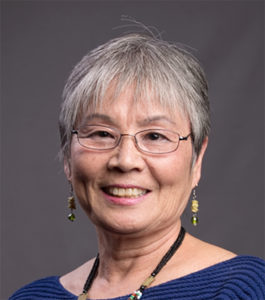Role model in development and delivery of wide-ranging, high impact, culturally-sensitive programs

Yasuko Sakamoto Kowalchuk, a pioneer of culturally sensitive services for Los Angeles’ diverse population, was seen as the heart of the Little Tokyo Service Center Community Development Corporation (LTSC) during her 36 years there. Because of her innovative ideas, her leadership abilities and her commitment, she was able to help build the bilingual and bicultural social work program for the Japanese and Japanese-American (Nikkei) communities that had been nearly nonexistent when she first arrived in the city.
Sakamoto began her career as a mental health worker in private practice in Tokyo, Japan, where she received two bachelor’s degrees from Meiji Gakuin University. Soon after moving to Los Angeles and starting work at the Little Tokyo Service Center, she earned her MSW and LCSW at UCLA. One of the Center’s primary purposes is to offer culturally and linguistically appropriate case management to its clients, including those who are homeless or experiencing mental or emotional challenges. To this end, Sakamoto, as founding director of the Social Service Department, designed and developed comprehensive programs to address the unique cultural needs of the Japanese and Nikkei populations.
Among the challenges Sakamoto faced in her work was the influence on many members of the community of the Japanese cultural values of enryo (hesitation to ask for help), gaman (enduring the unbearable) and haji (shame). The Nikkei Family Counseling Program that she created respects these values while providing a safe space for counseling and mental health services. Her sensitivity to the traditions and concerns of this population also informed the development of the Nikkei Tomodachi Program, in which bilingual volunteers visit frail seniors; the Alzheimer’s Support Group—the first for this community in the region; a transitional housing program for survivors of domestic violence; and the Nikkei Helpline, staffed by bilingual volunteers. She also launched support groups for other health-related issues, including cancer and stroke.
To sustain these and other projects, Sakamoto applied for and received grants and collaborated with government officials. She even initiated a series of tofu cookbooks to promote healthier eating, with profits from sales going to support services at the Center. Sakamoto trained and supervised the ever-growing staff in her department as well as serving as a mentor and providing technical assistance to those at other agencies hoping to adopt her strategies. The author of numerous articles on the Japanese-American experience, mental health and other social issues, she was also a sought-after speaker in the U.S. and in Japan on social work practice and volunteerism.
Described by a colleague as “a beacon for the professional practice of social work,” Yasuko Sakamoto began her career with the goal of improving the lives of the underserved, and she was able to use her knowledge, her skills and her passion to achieve it.